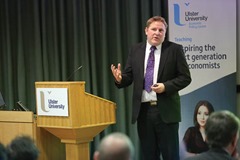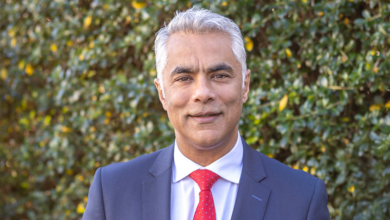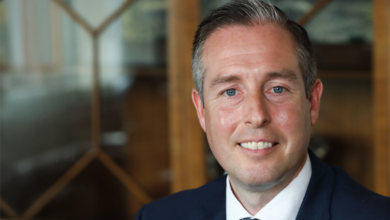Full view of economy needed
 NICEP is proposing a comprehensive model to give policy-makers a deeper perspective on how the regional economy operates.
NICEP is proposing a comprehensive model to give policy-makers a deeper perspective on how the regional economy operates.
The Northern Ireland Centre for Economic Policy (NICEP) plans to produce a macroeconomic model to help inform fiscal decision-making at Stormont. The centre’s Director, Neil Gibson, outlined its role and his ambitions for the think tank in his professorial lecture at Ulster University.
This would build on the existing regional model used by NICEP and the UK-wide work done by the Office for Budget Responsibility and the Institute for Fiscal Studies. Gibson hopes to recruit a small team of economists who would solely focus on developing the model.
Established in 2012, NICEP forms part of the Ulster Business School at Jordanstown. It has a 12-strong team and six funders: the university, First Trust Bank, Belfast Harbour, the Department of Enterprise, Trade and Investment, the Department of Finance and Personnel, and the Department for Employment and Learning.
Gibson explained that its robustness and independence is respected by the Executive, a view affirmed by ministers Stephen Farry and Simon Hamilton who attended the event. “I think we have built upon the benefit that anything we say is for the benefit of Northern Ireland,” Gibson commented. He also welcomed the greater awareness of economic issues in the media and society in general although there was also a need for more education to explain how Northern Ireland’s economy operates.
As for recent trends, he remarked: “Oil prices have really come down and really changed the game. That’s a massive change that is the one form of policy shift that everyone in this room has felt.” In weekly terms, the price drop gave the average employee enough to afford a meal in a small restaurant. One of the biggest political challenges was that the electorate in Britain is now “very aware of what we get” from the block grant after the Scottish referendum campaign.
Audiences, in his view, sometimes did not appreciate the scale of technical work that went into NICEP’s research i.e. testing and verifying equations and models. He would welcome the support of new funders and investors to help the centre to expand its work.
Content was always more important than presentation. Gibson’s own thinking had moved from being a “child of Thatcher” to a Keynesian approach; his preferred policy goal is full employment. However, NICEP does not approach economic policy from a particular ideological starting point and the core of its work is the collection and evaluation of accurate data.





